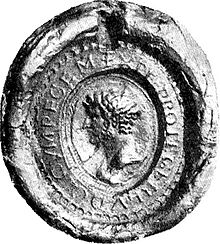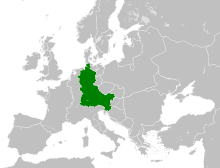
Back Lodewyk die Duitser Afrikaans Ludwig der Deutsche ALS لودفيش الجرماني Arabic لودفيش الجرمانى ARZ لوئی ژرمن AZB Людовік II Нямецкі Byelorussian Лудвиг Немски Bulgarian Loeiz Germania Breton Ludovik Njemački BS Lluís el Germànic Catalan
| Louis the German | |
|---|---|
 | |
| King of East Francia (King of Germany) | |
| Reign | c. 10 August 843 – 28 August 876 |
| Predecessor | Louis the Pious |
| Successor | Carloman of Bavaria (Bavaria) Louis the Younger (Saxony) Charles the Fat (Swabia) |
| Born | c. 806 |
| Died | 28 August 876 Frankfurt am Main |
| Burial | |
| Spouse | Emma of Altdorf (m. 827; d. 876) |
| Issue | Carloman of Bavaria Louis the Younger Charles the Fat |
| Dynasty | Carolingian |
| Father | Louis the Pious as King of the Franks |
| Mother | Ermengarde of Hesbaye |
| Signum manus |  |

Louis the German[a] (German: Ludwig der Deutsche; c. 806[3][4]/810[2] – 28 August 876), also known as Louis II of Germany (German: Ludwig II. von Deutschland),[b] was the first king of East Francia, and ruled from 843 to 876 AD. Grandson of emperor Charlemagne and the third son of Louis the Pious, emperor of Francia, and his first wife, Ermengarde of Hesbaye,[5] he received the appellation Germanicus shortly after his death, when East Francia became known as the kingdom of Germany.
After protracted clashes with his father and his brothers, Louis received the East Frankish kingdom in the Treaty of Verdun (843). His attempts to conquer his half-brother Charles the Bald's West Frankish kingdom in 858–59 were unsuccessful. The 860s were marked by a severe crisis, with the East Frankish rebellions of the sons, as well as struggles to maintain supremacy over his realm. In the Treaty of Meerssen he acquired Lotharingia for the East Frankish kingdom in 870. On the other hand, he tried and failed to claim both the title of Emperor and Italy. In the East, Louis was able to reach a longer-term peace agreement in 874 after decades of conflict with the Moravians. His rule shows a marked decline in creation of written administration and government documents, a trend that would continue into Ottonian times.[6]
- ^ Goldberg 2006, pp. 72–73.
- ^ a b Goldberg 2006, pp. 26–27.
- ^ Dutton 1990, p. 92.
- ^ Costambeys, Innes & MacLean 2011, p. xx.
- ^ Riche 1993, p. 145.
- ^ Prudentius (861). Annals of St. Bertin.
Cite error: There are <ref group=lower-alpha> tags or {{efn}} templates on this page, but the references will not show without a {{reflist|group=lower-alpha}} template or {{notelist}} template (see the help page).